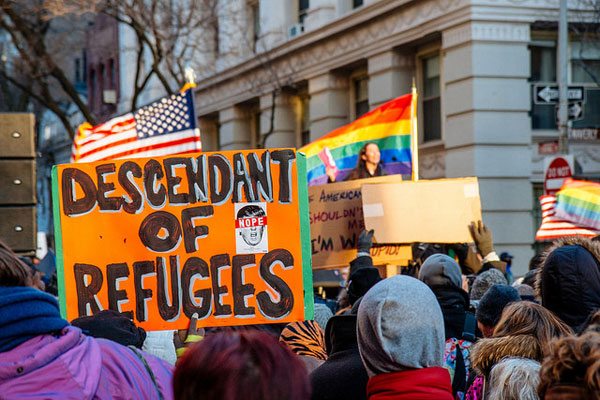
March 7, 2018; Washington Post and Baltimore Sun
In its most combative action thus far, the Department of Justice (DOJ) filed suit on March 6th against the state of California over its efforts to provide sanctuary for undocumented immigrants. The suit asks a federal judge to block three California laws enacted to limit cooperation of local law enforcement and businesses with Immigration and Customs Enforcement (ICE).
California, in declaring itself a “sanctuary state,” has gone further than other states in codifying new laws to protect its immigrant population. The three bills being challenged by DOJ:
- Prohibit private employers from providing immigration officials with access to workplaces or documents without a court order.
- Regulate detention centers through a new state inspection system.
- Limit state and local law enforcement communication with federal officials regarding some suspects and prohibits transfer of some people to federal custody.
California Attorney General Xavier Becerra reacted to the lawsuit by stating his belief that the laws are constitutional and that state and local law enforcement continue to partner with their federal counterparts to protect public safety. “State and local jurisdictions have the right to determine which policies are best for their communities,” Becerra said.
The lawsuit will test the limits of that theory, determining what power the federal government can exert over states and other local jurisdictions that have taken a stand against the Trump administration’s immigration policies. In their lawsuit, the Justice Department is arguing that “the Supremacy Clause does not allow California to obstruct the United States’ ability to enforce laws that Congress has enacted.”
In a speech to California law enforcement officials, the Washington Post reports that Attorney General Jeff Sessions said California’s actions “directly and adversely impact the work of our federal officers” and “undermine the duly-established immigration law in America.” Sessions, known for his anti-civil rights stances throughout his career, had the temerity to suggest that California was pushing the boundaries of secession, remarking:
Sign up for our free newsletters
Subscribe to NPQ's newsletters to have our top stories delivered directly to your inbox.
By signing up, you agree to our privacy policy and terms of use, and to receive messages from NPQ and our partners.
There is no nullification. There is no secession. Federal law is the supreme law of the land. I would invite any doubters to go to Gettysburg, or to the tombstones of John C. Calhoun and Abraham Lincoln. This matter has been settled.
California officials denounced the federal lawsuit and Sessions speech, roundly criticizing the federal government for spreading hate and tearing apart families. In response to a personal attack from Sessions regarding her having warned local immigrants of an impending ICE raid, Libby Schaaf, the mayor of Oakland, said in a statement:
How dare you vilify members of our community by trying to frighten the American public into thinking that all undocumented residents are dangerous criminals….How dare you distract the American people from a failed immigration system that tears apart decent families and forces the workers that our economy depends on to harvest our crops, deliver our services, and build our cities to live in fear and work under oppressed conditions. How dare you distort the reality about declining violent crime rates in a diverse, sanctuary city like Oakland to advance a racist agenda.
The California lawsuit represents the next battle front in the Trump administration’s efforts to realign the demographics of the US through deportations and intensified efforts to prevent people from seeking asylum or crossing the border without documentation. In addition to ramping up arrests of undocumented immigrants, the administration has announced the end of Temporary Protective Status for hundreds of thousands of Haitians, El Salvadorans, Hondurans, and Nicaraguans. Last September, President Trump also arbitrarily announced an end to the Deferred Action for Childhood Arrivals (DACA) program if Congress could not find a legislative solution by March 5, 2018. That deadline, too, has now passed, leaving hundreds of thousands of young people unsure about their futures.
In the meantime, cities across the country that have declared themselves sanctuaries are in the crosshairs of potential legal action. Having failed in their efforts to deny federal funding to “sanctuary cities,” the administration is threatening subpoenas against 23 jurisdictions, but cities are not backing down. Among the latest efforts are those focused on providing legal assistance to immigrants facing deportation proceedings. Studies show that legal representation has a significant impact on the outcome of these proceedings.
Baltimore announced this week that it will be spending $200,000 to pay for attorneys for local immigrants facing court actions. Half of the funds will come from the Vera Institute for Justice, which will also provide technical support identifying lawyers and implementing best practices. Baltimore is one of 11 jurisdictions participating in the Vera Institute’s SAFE Cities Network.—Karen Kahn













